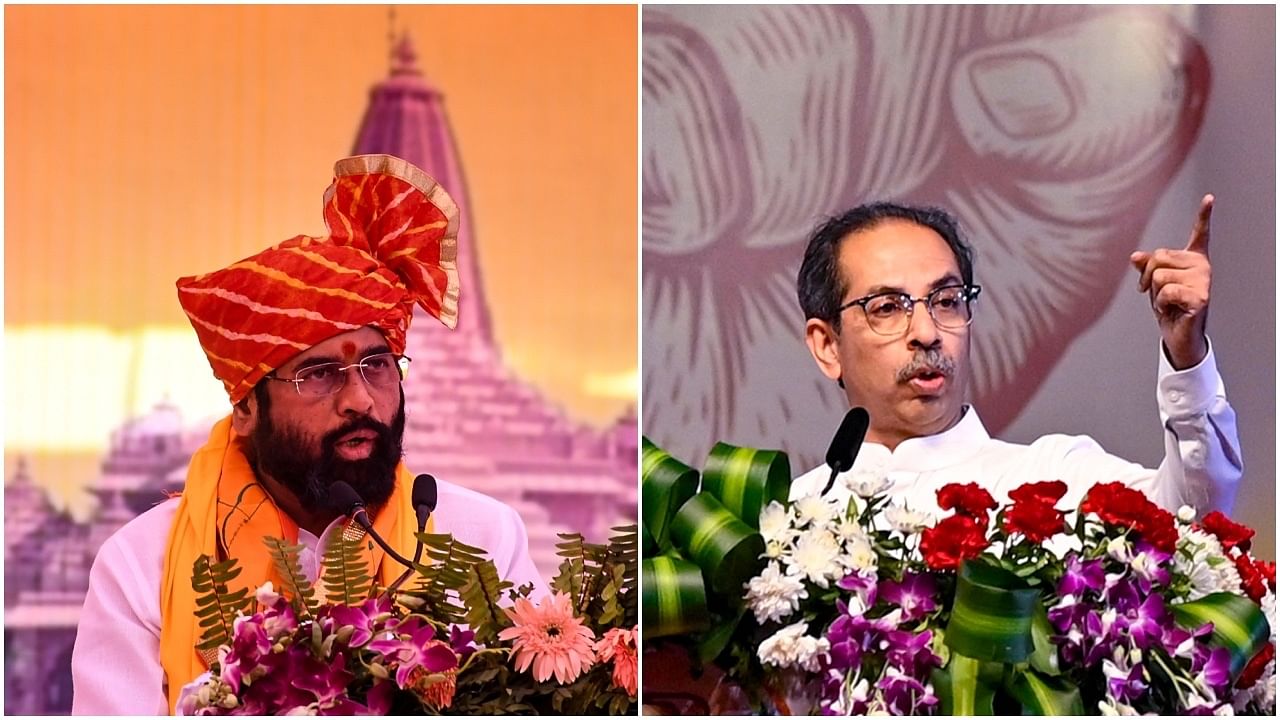
Maharashtra Chief Minister Eknath Shinde (L) and Shiv Sena (UBT) chief Uddhav Thackeray (R).
Credit: PTI File Photos
With a population comprising richest-of-the-rich and poorest-of-the-poor besides a thriving cosmopolitan middle-class, the financial capital of Mumbai often throws up surprising results.
Legends, stalwarts and celebrities have gone to the Lok Sabha from Mumbai, often referred to as ‘Urbs Prima in Indis’, ‘Maximum City’, ‘City of Dreams’.
Part of the coastal Konkan belt, Mumbai comprises six seats in Lok Sabha: Mumbai North, Mumbai North-West, Mumbai North-East, Mumbai North-Central, Mumbai South-Central and Mumbai South, spread over two districts of Mumbai City and Mumbai Suburban.
The BrihanMumbai Municipal Corporation (BMC), the civic body, is one of the biggest in India and the richest whose budget is bigger than some smaller states.
Mumbai goes to polls in fifth phase on 20 May, the final phase of polling in Maharashtra. Earlier, the results seemed balanced, however, post delimitation in 2008, when the fight became between the Congress-NCP Democratic Front and Shiv Sena-BJP saffron alliance, the results were one-sided.
In 2009, Congress-NCP alliance swept all the seats, with Congress winning 5 segments and NCP 1. After the saffron wave, in 2014 as well as in 2019, the BJP and Shiv Sena managed to oust the grand old party, winning 3 segments each in both the election years.
With the political churning between 2019-2024, the fight is now between Maha Yuti involving BJP-Shiv Sena-NCP and the Maha Vikas Aghadi involving Congress, Uddhav Thackeray-led Shiv Sena (UBT) and Sharad Pawar-led NCP (SP).
It remains to be seen whether the BJP-led alliance agrees to spare one seat for Raj Thackeray-led MNS.
As the elections to the BMC have not yet been held for the past two years, the political parties have been able to fathom the exact ground situation.
The undivided Shiv Sena with the help of BJP had ruled the BMC for quarter of a century.
Even though a lot of former corporators have moved from Thackeray’s side to chief minister Eknath Shinde, a lot of things are in store in the next couple of months. The BJP has made plans to end the dominance of the Thackerays in the Mumbai civic body.
Mumbai is important for both Congress and BJP, the two national parties.
The birth place of Congress is Gokuldas Tejpal Auditorium (earlier Gokuldas Tejpal Sanskrit College), where Congress was formed on 28 December, 1985, when 72 leaders, social reformers, journalists and lawyers congregated for the first session of Indian National Congress, marking the start of what is now known as the grand old party. Allan Octavian Hume, Dadabhai Naoroji and Womesh Chunder Bonnerjee , Badruddin Tyabji and Pherozeshah Mehta were some of the delegates present at this event.
On 6 April, 1980, the BJP was born and a few months later at the Mumbai rally, BJP stalwart Atal Bihari Vajpayee, who later became Prime Minister, said, “Andhera Chatega, Sooraj Niklega, Kamal Khilega (The darkness will go, the sun will come out and the lotus will bloom).”
Over the years, the Shiv Sena has been one of the big factors in Mumbai - and for Thackeray, the now head of Shiv Sena (UBT), it is a major task to resurrect the party.
In Mumbai's 6 Lok Sabha seats and 36 Vidhan Sabha seats, the majority are with BJP, spearheaded by Devendra Fadnavis and Shinde, as many shifted from Thackeray’s team.
Mumbai is sure to witness rebellion and resentment, as competition to contest gains momentum with upcoming Lok Sabha and Vidhan Sabha elections.